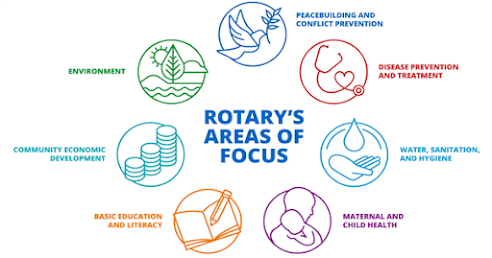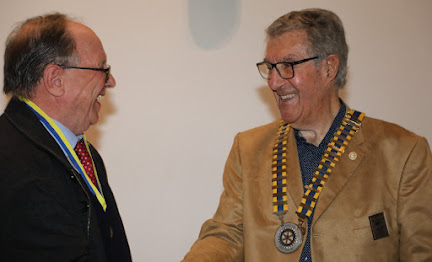As you know, everyone in the club has to be on a committee because that is how Rotary is organised to ensure that every member has a voice. When you join one of the first things you are asked should be which committee you want to be on and always Community Service tends to be the first choice and it needs to have the most members because of the nature of the portfolio.
When our club declined in numbers the committee system fell away simply because it was impractical but the steady increase in membership over the last couple of years has meant that the club has needed to re-institute the committee system gradually but now more formally and we have seen how our new membership has been a leaven within the club as a whole. President Andrew intends to have our committee system working for all members so if you want of be a member of a specific committee or have any questions just speak to him.
Fundraising is much under discussion within the club at the moment and here is an excerpt from Nivash Singh's email on the subject and beyond which he sent to members. It's an approach that is worth sharing with a larger audience.
There is a school in Westdene (as an example), where when the electricity goes off, the parents (let's give one of them a name, let's say James) are forced to come by and take their kids from school which then impacts those parents so negatively, seeing that most of them are generally blue collar workers (example again), such that they risk being replaced at work, thereby losing their jobs, resulting in them being on the street, overcome with depression, leading them into a world of drugs, and a hindrance to their child's basic education such that that child ends up committing a crime and behind bars in 15 years, and if not behind bars then to a life of hustling it out for the majority of its adult life - unless graced with luck, looks or intelligence.
Elsewhere there could be little non-profit organisation (let's call them Soweto Home Waste) who are seeking to provide skills and a mobile facility for waste management, i.e. the sorting of waste items in terms of perishables, plastic, glass, tin and so on, as well as teaching skills in home composting. They, while struggling to get going, have a plan on how to generate revenue from the on-sell of those waste products gained, together with a menu of possible out of the box compost solutions.
Elsewhere
a minister somewhere announces that waste management is becoming a national
concern, as our dumping sites are hitting 90% fill capacity, and a plan past
the next 5 years needs to be considered.
Meanwhile in other news, Massmart has put on their corporate social investment (CSI) book of budget, R1m for the year 2025, towards environmental, social and governance (ESG) initiatives.
To wrap the story back, we may want to think about how we solve for the blanks, and these may be among (for example), how do we find these kind CSI's who are waiting to be tapped into, where we can connect their purpose to someone else's need, in this case being the start of the initial funding for Soweto Waste Management, allowing them to get going and create sustainable solutions, which they can then can possibly take to government, from the perspective of (being one among many with some capability to contribute towards) addressing a national issue and maybe attain ongoing sponsorship for hiring more staff, where one of them ends up being Jessica, a domestic worker in Westdene, who goes on to quit domestic working and grow the sustainable business in her area, and when one day her husband is fired from work (oh, did I forget to mention, Jessica is married to our protagonist James:), she says to him, "don’t you worry, let me show you how to make a compost garden", which he manages to turn into a viable revenue stream on the side providing for maybe a better than basic education for their child, all of which in turn ties back to several of our Rotary sustainable development goals.
Abstracting from the above, the theme may be things like Sustainability, Abuse, Sanitation, Water and so on, and our thematic storyline on these would be the onion layering / deeper levels (n+1) of permutations where there are a composition of solutions and players / parties / stakeholders, who opt to exist in a beneficial (either mutually or one-sided) sort of ecosystem, which is able to be tied back to the general theme, which is able to find harmony with our ESG's.
I think that the concept of a multi-story with a level of intertwining and complexity will help to distinguish our club and expand our capability, as we go into the future.
Tx
Nivash
Saturday 3rd August Social Breakfast. 09:30 at Elm St Cafe, Shop 1 Dowerglen Plaza, Cnr Elm & Sycamore Streets, Dowerglen.
Dave Holmes will be there as many of you wanted to talk further to him after he spoke to us about his epic motorcycle ride round South Africa on his Matchless. It is also possible that Douglass Grossett may be able to attend because of the interest in his talk on Jewelry Making last week.
Please make sure that Nivash knows by Thursday.
Next Week
Our planned speaker has had to travel for work from this Wednesday for a couple of weeks but obviously we will have a speaker.
Last Week
It was a fascinating talk plus demonstrations of jewelry making by Douglas Grossett and there was a lot of interest. I am hoping he will be able to attend our breakfast because a lot of members wanted to know more.
In future I will invite certain speakers to our breakfasts when members want to meet the person and continue the conversation.
International - Lebanon (With the current situation in Lebanon this article shows another side)
Like many young professionals in Lebanon, Anhal Kozhaya was ready to take his place among the latest generation to flee the country’s troubles — not war this time but an economic crisis that has driven widespread poverty, social unrest, and a collapse of public services. Then, he had second thoughts.
“Rotary is, honestly speaking, what kept me here in Lebanon,” says the 22-year-old, who works as an administrative officer at the British Embassy in Beirut. “Rotary is what kept me motivated and inspired and always wanting more for my country. If that wasn’t the case, I would have left this country a long time ago and wouldn’t have thought twice about coming back.”
Kozhaya is president of the Rotary Club of Beirut Pax Potentia, or “the power of peace” in Latin. The year-old club, which focuses on peacebuilding, has its origins in a project funded by a Rotary Foundation global grant. Another notable attribute: Its 17 members have an average age of 23, a young demographic that’s leaving Lebanon in high numbers.
Members of the Rotary Club of Beirut Pax Potentia, including (from left) Elissa Tabet, Jeanne d’Arc Davoulbeuyukian, Noor Akoum, and Anhal Kozhaya, are steeped in the principles of Positive Peace.
Lebanon, once known as the Switzerland of the Middle East for its status as a regional banking center, has experienced waves of emigration over the past half-century. Those migrations started with the 1975-90 civil war and have accelerated during an economic crisis beginning in 2019 that has fueled triple-digit inflation, shut down the banking sector, and pushed millions into poverty.
The club’s first public event was an international conference on youths as agents of peace that helped generate ideas for projects. The club, chartered in June 2023, typically meets weekly either online or in a co-working space in Beirut. Its members are so committed that even those who’ve had to move overseas to Italy, Malta, and Belgium to study continue to log on when they can.
In the background of the economic crisis, Lebanon also remains deeply divided along sectarian lines more than three decades after its devastating civil war. Today, 18 recognised religious sects compete for power in a fractious political system, with near-constant interference by neighbouring countries.
Lebanon’s challenges need to be examined in relation to Positive Peace, Kozhaya says. “You cannot talk about the environment without addressing peace,” he explains. “You cannot talk about women’s rights, tolerance, human rights, and community economic development without bringing in a peacebuilding perspective.”
For one project, club members have visited the Maryam and Martha Community, an organisation helping women and girls who have experienced gender-based violence. They raised funds for the organisation and collected donations, including food, basic hygiene products, and clothing.
In February, they hosted a workshop on the relationship between peacebuilding and theatre. Among its other aims, the club is planning another peace conference, a fashion show with an emphasis on inclusion and diversity, and a scholarship fund focused on peace building. Members also want to mentor high school students.
Bayan Fakih, 21, another of those founding members, is studying for her master’s in international politics in Belgium but makes sure to join the club’s online events. She is surprised by how much the club has opened up her perspectives related to peace and what can be achieved at community level. “We’re not policy-makers. We’re trying to promote the idea of peace from a tangible perspective to people around us, to our communities, and even to the world,” she says.
For member Elise Korban, 31, the club is a place where she can mix her artistic interests with her peace building passions. She works at a human rights nonprofit organisation and has a background in visual arts, architecture, and social science.
Korban, who has had difficult discussions with her father about his experiences in the civil war, believes it’s important for artists to help foster a collective memory about Lebanon’s history. “Our history books stop after World War II,” she says. “The civil war is not in the books because there are different points of view. So as artists we are responsible to give a collective memory to these events.”
A shared vision of the future is important too. “I believe Rotarians are the torchbearers and they bring light to communities where they are present,” Kozhaya says. “Beirut has been the subject of much violence and yet it is a phoenix that has risen from the ashes so many times. Our work with Rotary offers a message to everyone in Lebanon that we have a duty to work within a framework of peace.”

























